Unit 1 A Trip to the Silk Road Lesson 1 A Trip to China课件(共22张PPT) 2023-2024学年冀教版英语七年级下册
文档属性
| 名称 | Unit 1 A Trip to the Silk Road Lesson 1 A Trip to China课件(共22张PPT) 2023-2024学年冀教版英语七年级下册 | 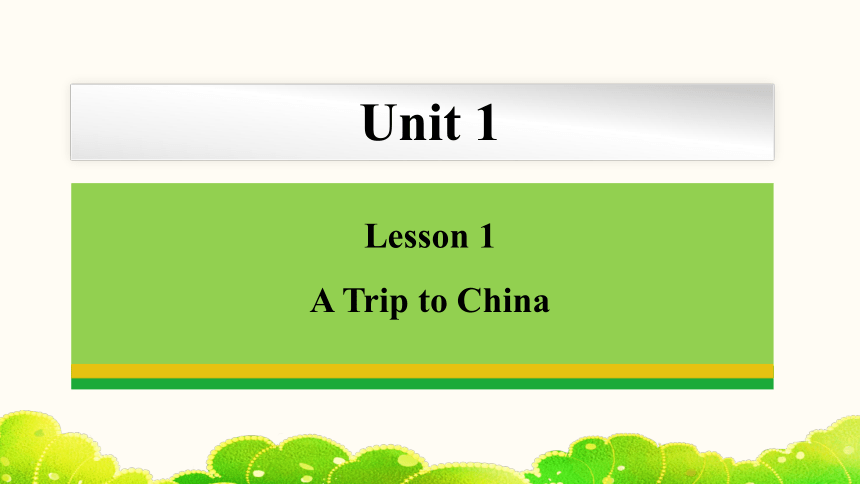 | |
| 格式 | pptx | ||
| 文件大小 | 3.5MB | ||
| 资源类型 | 教案 | ||
| 版本资源 | 冀教版 | ||
| 科目 | 英语 | ||
| 更新时间 | 2024-01-03 09:03:01 | ||
图片预览

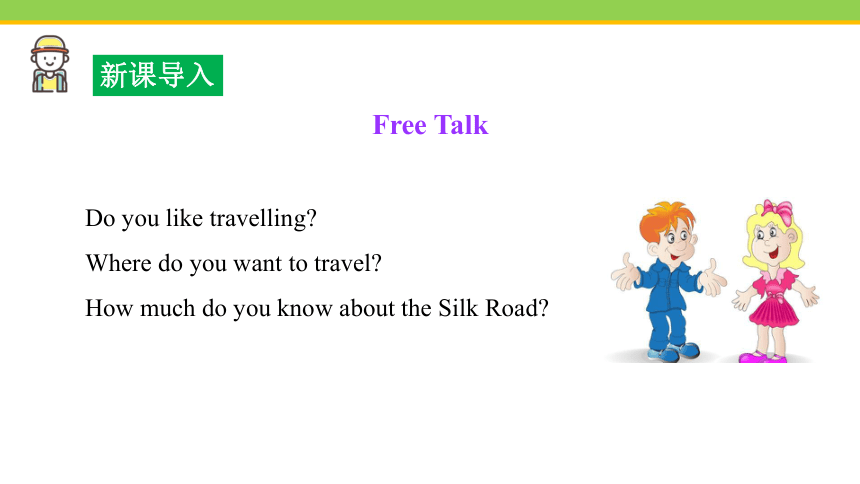

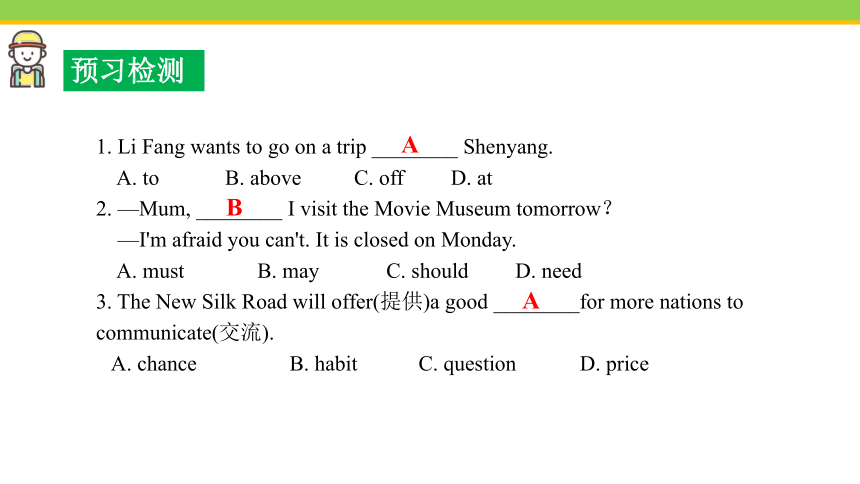
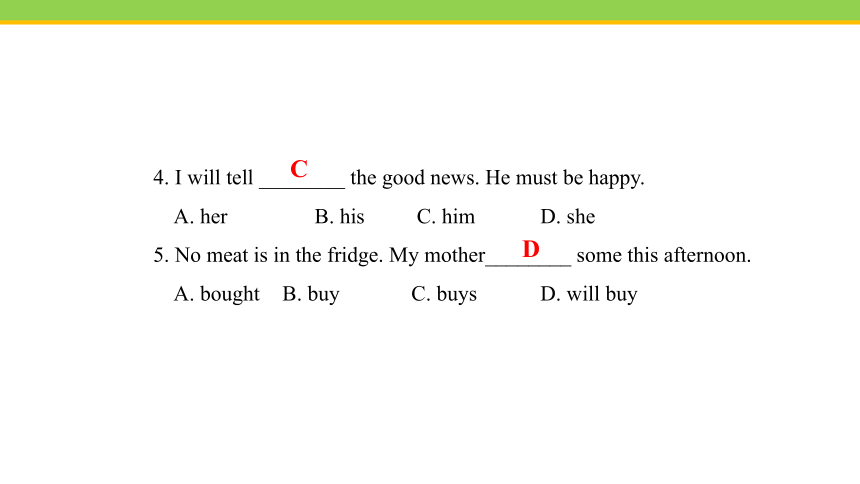
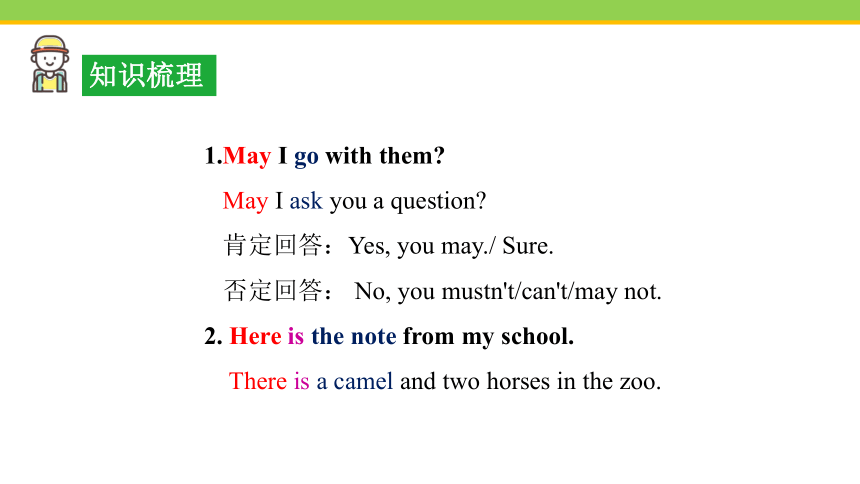
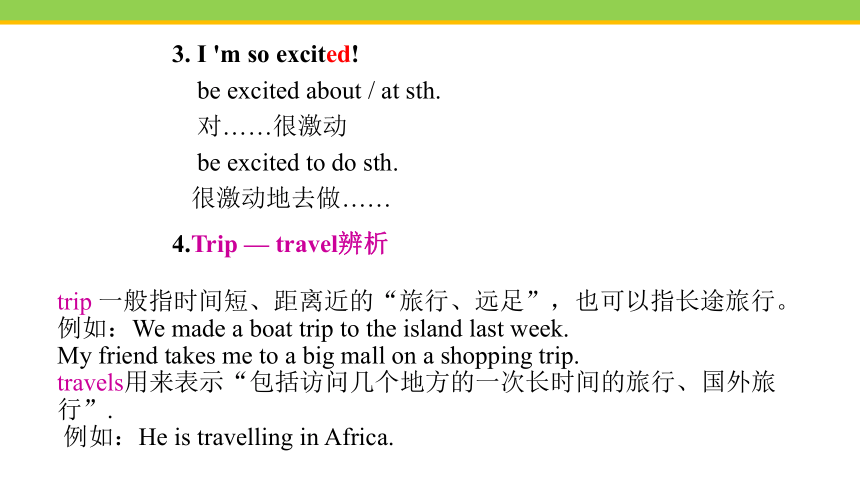
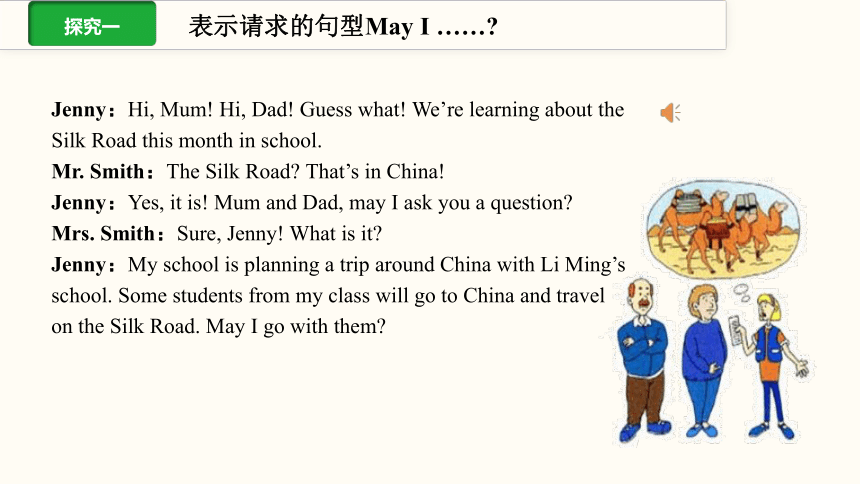
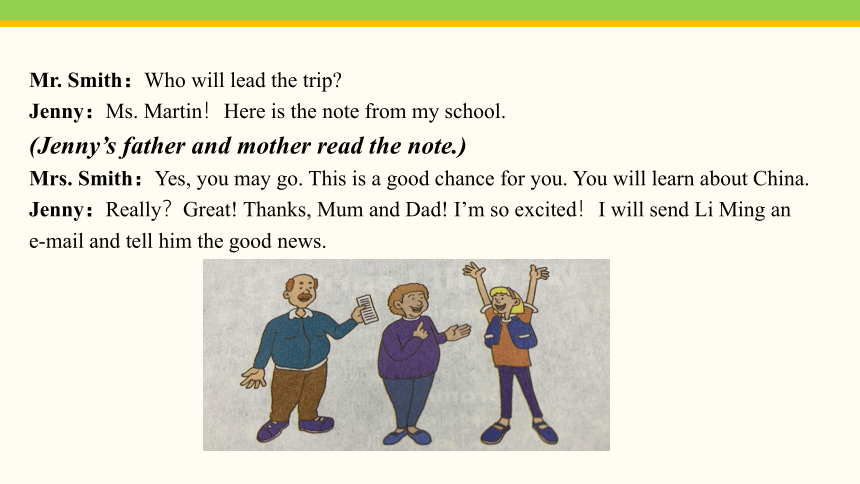
文档简介
(共22张PPT)
Unit 1
Lesson 1
A Trip to China
新课导入
Do you like travelling
Where do you want to travel
How much do you know about the Silk Road
Free Talk
1.能记住并能正确运用下列单词:
trip, silk, road, lead, note, chance, send, news.
2.掌握由“will+动词原形”构成的一般将来时.
3.会运用句型“May I... ”及其肯定和否定回答
“Sure./Yes, you may. / Sorry.”
预习检测
1. Li Fang wants to go on a trip ________ Shenyang.
A. to B. above C. off D. at
2. —Mum, ________ I visit the Movie Museum tomorrow?
—I'm afraid you can't. It is closed on Monday.
A. must B. may C. should D. need
3. The New Silk Road will offer(提供)a good ________for more nations to communicate(交流).
A. chance B. habit C. question D. price
A
B
A
4. I will tell ________ the good news. He must be happy.
A. her B. his C. him D. she
5. No meat is in the fridge. My mother________ some this afternoon.
A. bought B. buy C. buys D. will buy
C
D
知识梳理
1.May I go with them
May I ask you a question
肯定回答:Yes, you may./ Sure.
否定回答: No, you mustn't/can't/may not.
2. Here is the note from my school.
There is a camel and two horses in the zoo.
3. I 'm so excited!
be excited about / at sth.
对……很激动
be excited to do sth.
很激动地去做……
4.Trip — travel辨析
trip 一般指时间短、距离近的“旅行、远足”,也可以指长途旅行。
例如:We made a boat trip to the island last week.
My friend takes me to a big mall on a shopping trip.
travels用来表示“包括访问几个地方的一次长时间的旅行、国外旅行”.
例如:He is travelling in Africa.
表示请求的句型May I ……
Jenny:Hi, Mum! Hi, Dad! Guess what! We’re learning about the Silk Road this month in school.
Mr. Smith:The Silk Road That’s in China!
Jenny:Yes, it is! Mum and Dad, may I ask you a question
Mrs. Smith:Sure, Jenny! What is it
Jenny:My school is planning a trip around China with Li Ming’s school. Some students from my class will go to China and travel on the Silk Road. May I go with them
Mr. Smith:Who will lead the trip
Jenny:Ms. Martin!Here is the note from my school.
(Jenny’s father and mother read the note.)
Mrs. Smith:Yes, you may go. This is a good chance for you. You will learn about China.
Jenny:Really?Great! Thanks, Mum and Dad! I’m so excited!I will send Li Ming an e mail and tell him the good news.
1. Jenny is learning about the Silk Road this month in school. ( )
2. Li Ming’s school is planning a trip to Canada. ( )
3. Ms. Martin will go to China with the students. ( )
1.Listen and write true (T) or false (F).
F
T
T
Let's Do It !
Role-play the conversation
阅读对话,然后每组选择三位同学,分别扮演詹妮及詹妮的父母,分角色表演对话。
Hi, Mum! Hi, Dad! Guess what! We’re learning about the Silk Road this month in school.
The Silk Road That’s in China!
Sure, Jenny! What is it
Yes, it is! Mum and Dad, may I ask you a question
My school is planning a trip around China with Li Ming’s school. Some students from my class will go to China and travel on the Silk Road. May I go with them
Who will lead the trip
Ms. Martin!Here is the note from my school.
Yes, you may go. This is a good chance for you. You will learn about China.
Really Great! Thanks, Mum and Dad! I’m so excited!I will send Li Ming an e mail and tell him the good news.
2. Read the dialogue in the lesson and answer the questions.
1.What is Jenny’s school planning?
Her school is planning a trip around China with Li Ming’ school.
2.Who will lead the trip?
Ms. Martin.
3.What does Mrs.Smith think about the trip?
She thinks it is a good chance for Jenny to learn about China.
4. Why will Jenny send Li Ming an e mail?
Because she wants to tell him the good news.
Let's Do It !
3. Fill in the blanks with the words in the box.
1.I plan to go on a ________ to Beijing this summer.
2.I have some good ________ for you.
3.Many people ________ to Hainan for their winter holiday.
4.Follow me! I will ________ you there.
5.I want to go to Beijing. Then I will have a ________ to see the Great Wall.
6.Leave a ________ for your parents so they won’t worry about you.
trip
news
travel
lead
chance
note
lead trip chance news travel note
Let's Do It !
Make conversations
学生两两合作,运用May I …… 的句型来进行简短对话 。
例如:—May I borrow your book
—Yes, you may. / Yes, please./ All right./ Sure./ OK.(肯定回答)
/—No, you may not./ No, you'd better not.(否定回答)
May I borrow your book
Yes, you may.
活动小结
May I ask you a question /May I go with them
这两个句子是我们已经学过的 ,表示委婉的请求,其中may是 .
肯定回答: ____________________________________
否定回答: ____________________________________
一般疑问句
情态动词
Yes, you may. / Yes, please./ All right./ Sure./ OK.
I'm sorry, you can't. / You'd better not.
由“will+动词原形”构成的一般将来时
4. Work in groups. Read the note from Jenny’s school and take turns
asking for permission to go on the trip.
Dear parents,
We are planning a trip to China during the March break.We will join
our sister school in China on a trip to the Silk Road. All students in Grade
7 are invited. Ms. Martin will travel with the students. Her class is doing
a China Study this term. The group will leave on March 5 and come
back on March 15. For more information, please come to the meeting on
Wednesday at 7 p.m.
Yours truly,
Mr. Brian Franklin
Task tips:What do you want to do Where/When do you want to go Who will you go with
小组内讨论Let's Do It!(4)短文下面的几个问题,并给出答案,每组派代表上台展示答案。
Group work
What do you want to do
Where/When do you want to go
Who will you go with
I want to plan a trip.
I want to go to China and I will go there during the March break.
All my classmates and Ms.Martin will lead the trip.
Dear parents,
We are planning a trip to China during the March break.We will join
our sister school in China on a trip to the Silk Road. All students in Grade
7 are invited. Ms. Martin will travel with the students. Her class is doing
a China Study this term. The group will leave on March 5 and come
back on March 15. For more information, please come to the meeting on
Wednesday at 7 p.m.
Yours truly,
Mr. Brian Franklin
找出短文中的时态为一般将来时的句子并总结结构规律。
Pair work
一般将来时结构:主语+will+动词原形+其他。
活动小结
含有一般将来时的句子表示事情发生在___________.
其结构为“_____________________________”.其中
will是____动词,后面的动词用_________.
将来
主语+will+动词原形+其他
助
原形
当堂检测
一、根据句意及汉语提示填空。
1.We will go on a (旅行) to Hangzhou this vacation.
2.We're all excited to hear this good (消息).
3.Who will (带领) us to travel to Qingdao
4.You should take (笔记) in class.
5.It's a good (机会) for me to learn about Western culture.
trip
news
lead
notes
chance
二、根据汉语提示完成句子。
1.莉莉,这儿有一份来自你朋友的礼物。
Lily, a gift your friend.
2.我有些好消息要告诉你。
I have tell you.
3.这个周末谁将带你去农场
Who you to the farm this weekend
4.我们下周要去山西旅游。
We Shanxi next week.
5.这周我们正在学习有关数词的知识。
We are numerals this week.
here is from
some good news to
will lead to go
will go on a trip to
learning about
Unit 1
Lesson 1
May I ask you a question /May I go with them
这两个句子是我们已经学过的 ,表示委婉的请求,其中may是 .
肯定回答: ____________________________________________________
否定回答: ____________________________________________________
一般疑问句
情态动词
Yes, you may. / Yes, please./
All right./ Sure./ OK.
I'm sorry, you can't. /
You'd better not.
含有一般将来时的句子表示事情发生在___________.
其结构为“_______________________”.其中
will是____动词,后面的动词用_________.
将来
主语+will+动词原形+其他
助
原形
Unit 1
Lesson 1
A Trip to China
新课导入
Do you like travelling
Where do you want to travel
How much do you know about the Silk Road
Free Talk
1.能记住并能正确运用下列单词:
trip, silk, road, lead, note, chance, send, news.
2.掌握由“will+动词原形”构成的一般将来时.
3.会运用句型“May I... ”及其肯定和否定回答
“Sure./Yes, you may. / Sorry.”
预习检测
1. Li Fang wants to go on a trip ________ Shenyang.
A. to B. above C. off D. at
2. —Mum, ________ I visit the Movie Museum tomorrow?
—I'm afraid you can't. It is closed on Monday.
A. must B. may C. should D. need
3. The New Silk Road will offer(提供)a good ________for more nations to communicate(交流).
A. chance B. habit C. question D. price
A
B
A
4. I will tell ________ the good news. He must be happy.
A. her B. his C. him D. she
5. No meat is in the fridge. My mother________ some this afternoon.
A. bought B. buy C. buys D. will buy
C
D
知识梳理
1.May I go with them
May I ask you a question
肯定回答:Yes, you may./ Sure.
否定回答: No, you mustn't/can't/may not.
2. Here is the note from my school.
There is a camel and two horses in the zoo.
3. I 'm so excited!
be excited about / at sth.
对……很激动
be excited to do sth.
很激动地去做……
4.Trip — travel辨析
trip 一般指时间短、距离近的“旅行、远足”,也可以指长途旅行。
例如:We made a boat trip to the island last week.
My friend takes me to a big mall on a shopping trip.
travels用来表示“包括访问几个地方的一次长时间的旅行、国外旅行”.
例如:He is travelling in Africa.
表示请求的句型May I ……
Jenny:Hi, Mum! Hi, Dad! Guess what! We’re learning about the Silk Road this month in school.
Mr. Smith:The Silk Road That’s in China!
Jenny:Yes, it is! Mum and Dad, may I ask you a question
Mrs. Smith:Sure, Jenny! What is it
Jenny:My school is planning a trip around China with Li Ming’s school. Some students from my class will go to China and travel on the Silk Road. May I go with them
Mr. Smith:Who will lead the trip
Jenny:Ms. Martin!Here is the note from my school.
(Jenny’s father and mother read the note.)
Mrs. Smith:Yes, you may go. This is a good chance for you. You will learn about China.
Jenny:Really?Great! Thanks, Mum and Dad! I’m so excited!I will send Li Ming an e mail and tell him the good news.
1. Jenny is learning about the Silk Road this month in school. ( )
2. Li Ming’s school is planning a trip to Canada. ( )
3. Ms. Martin will go to China with the students. ( )
1.Listen and write true (T) or false (F).
F
T
T
Let's Do It !
Role-play the conversation
阅读对话,然后每组选择三位同学,分别扮演詹妮及詹妮的父母,分角色表演对话。
Hi, Mum! Hi, Dad! Guess what! We’re learning about the Silk Road this month in school.
The Silk Road That’s in China!
Sure, Jenny! What is it
Yes, it is! Mum and Dad, may I ask you a question
My school is planning a trip around China with Li Ming’s school. Some students from my class will go to China and travel on the Silk Road. May I go with them
Who will lead the trip
Ms. Martin!Here is the note from my school.
Yes, you may go. This is a good chance for you. You will learn about China.
Really Great! Thanks, Mum and Dad! I’m so excited!I will send Li Ming an e mail and tell him the good news.
2. Read the dialogue in the lesson and answer the questions.
1.What is Jenny’s school planning?
Her school is planning a trip around China with Li Ming’ school.
2.Who will lead the trip?
Ms. Martin.
3.What does Mrs.Smith think about the trip?
She thinks it is a good chance for Jenny to learn about China.
4. Why will Jenny send Li Ming an e mail?
Because she wants to tell him the good news.
Let's Do It !
3. Fill in the blanks with the words in the box.
1.I plan to go on a ________ to Beijing this summer.
2.I have some good ________ for you.
3.Many people ________ to Hainan for their winter holiday.
4.Follow me! I will ________ you there.
5.I want to go to Beijing. Then I will have a ________ to see the Great Wall.
6.Leave a ________ for your parents so they won’t worry about you.
trip
news
travel
lead
chance
note
lead trip chance news travel note
Let's Do It !
Make conversations
学生两两合作,运用May I …… 的句型来进行简短对话 。
例如:—May I borrow your book
—Yes, you may. / Yes, please./ All right./ Sure./ OK.(肯定回答)
/—No, you may not./ No, you'd better not.(否定回答)
May I borrow your book
Yes, you may.
活动小结
May I ask you a question /May I go with them
这两个句子是我们已经学过的 ,表示委婉的请求,其中may是 .
肯定回答: ____________________________________
否定回答: ____________________________________
一般疑问句
情态动词
Yes, you may. / Yes, please./ All right./ Sure./ OK.
I'm sorry, you can't. / You'd better not.
由“will+动词原形”构成的一般将来时
4. Work in groups. Read the note from Jenny’s school and take turns
asking for permission to go on the trip.
Dear parents,
We are planning a trip to China during the March break.We will join
our sister school in China on a trip to the Silk Road. All students in Grade
7 are invited. Ms. Martin will travel with the students. Her class is doing
a China Study this term. The group will leave on March 5 and come
back on March 15. For more information, please come to the meeting on
Wednesday at 7 p.m.
Yours truly,
Mr. Brian Franklin
Task tips:What do you want to do Where/When do you want to go Who will you go with
小组内讨论Let's Do It!(4)短文下面的几个问题,并给出答案,每组派代表上台展示答案。
Group work
What do you want to do
Where/When do you want to go
Who will you go with
I want to plan a trip.
I want to go to China and I will go there during the March break.
All my classmates and Ms.Martin will lead the trip.
Dear parents,
We are planning a trip to China during the March break.We will join
our sister school in China on a trip to the Silk Road. All students in Grade
7 are invited. Ms. Martin will travel with the students. Her class is doing
a China Study this term. The group will leave on March 5 and come
back on March 15. For more information, please come to the meeting on
Wednesday at 7 p.m.
Yours truly,
Mr. Brian Franklin
找出短文中的时态为一般将来时的句子并总结结构规律。
Pair work
一般将来时结构:主语+will+动词原形+其他。
活动小结
含有一般将来时的句子表示事情发生在___________.
其结构为“_____________________________”.其中
will是____动词,后面的动词用_________.
将来
主语+will+动词原形+其他
助
原形
当堂检测
一、根据句意及汉语提示填空。
1.We will go on a (旅行) to Hangzhou this vacation.
2.We're all excited to hear this good (消息).
3.Who will (带领) us to travel to Qingdao
4.You should take (笔记) in class.
5.It's a good (机会) for me to learn about Western culture.
trip
news
lead
notes
chance
二、根据汉语提示完成句子。
1.莉莉,这儿有一份来自你朋友的礼物。
Lily, a gift your friend.
2.我有些好消息要告诉你。
I have tell you.
3.这个周末谁将带你去农场
Who you to the farm this weekend
4.我们下周要去山西旅游。
We Shanxi next week.
5.这周我们正在学习有关数词的知识。
We are numerals this week.
here is from
some good news to
will lead to go
will go on a trip to
learning about
Unit 1
Lesson 1
May I ask you a question /May I go with them
这两个句子是我们已经学过的 ,表示委婉的请求,其中may是 .
肯定回答: ____________________________________________________
否定回答: ____________________________________________________
一般疑问句
情态动词
Yes, you may. / Yes, please./
All right./ Sure./ OK.
I'm sorry, you can't. /
You'd better not.
含有一般将来时的句子表示事情发生在___________.
其结构为“_______________________”.其中
will是____动词,后面的动词用_________.
将来
主语+will+动词原形+其他
助
原形
同课章节目录
- Unit 1 A Trip to the Silk Road
- Lesson 1 A Trip to China
- Lesson 2 Meet You in Beijing
- Lesson 3 A Visit to Xi'an
- Lesson 4 A Visit to Lanzhou
- Lesson 5 Another Stop along the Silk Road
- Lesson 6 Jenny's Diary
- Unit 2 It's Show Time!
- Lesson 7 What's Your Project about?
- Lesson 8 Marco Polo and the Silk Road
- Lesson 9 Danny's School Project
- Lesson 10 Music and Dance
- Lesson 11 Food in China
- Lesson 12 A Blog about the Silk Road
- Unit 3 School Life
- Lesson 13 How Is School Going?
- Lesson 14 Jenny's School Life
- Lesson 15 Making a Difference
- Lesson 16 We Are with You!
- Lesson 17 School Science Fai
- Lesson 18 Teaching in China
- Unit 4 After-School Activities
- Lesson 19 A Dinner Date
- Lesson 20 Join Our Club!
- Lesson 21 What Is Your Club Type?
- Lesson 22 Big Plans for the Weekend
- Lesson 23 A Weekend with Grandma
- Lesson 24 How was Your Weekend?
- Unit 5 I Love Learning English!
- Lesson 25 A Phone Friend
- Lesson 26 Online Phone Calls
- Lesson 27 Amazing English
- Lesson 28 How Do I Learn English?
- Lesson 29 A Door to the World
- Lesson 30 Writing an E-mail in English
- Unit 6 Seasons
- Lesson 31 What Strange Weather!
- Lesson 32 I Can't Wait for Winter!
- Lesson 33 Kim's Favourite Season
- Lesson 34 Steven's Report
- Lesson 35 Surfing in Sydney
- Lesson 36 Spring in China
- Unit 7 Sports and Good Health
- Lesson 37 You Are What You Eat!
- Lesson 38 Stay Healthy!
- Lesson 39 Danny's Report
- Lesson 40 Move Your Body
- Lesson 41 Were People Healthy Then?
- Lesson 42 Know Yourself
- Unit 8 Summer Holiday Is Coming!
- Lesson 43 Have a Good Summer!
- Lesson 44 Volunteering in Summe
- Lesson 45 Baseball Season
- Lesson 46 Get Ready for Summer Holiday!
- Lesson 47 Summer Plans
- Lesson 48 Li Ming's Summer Holiday
